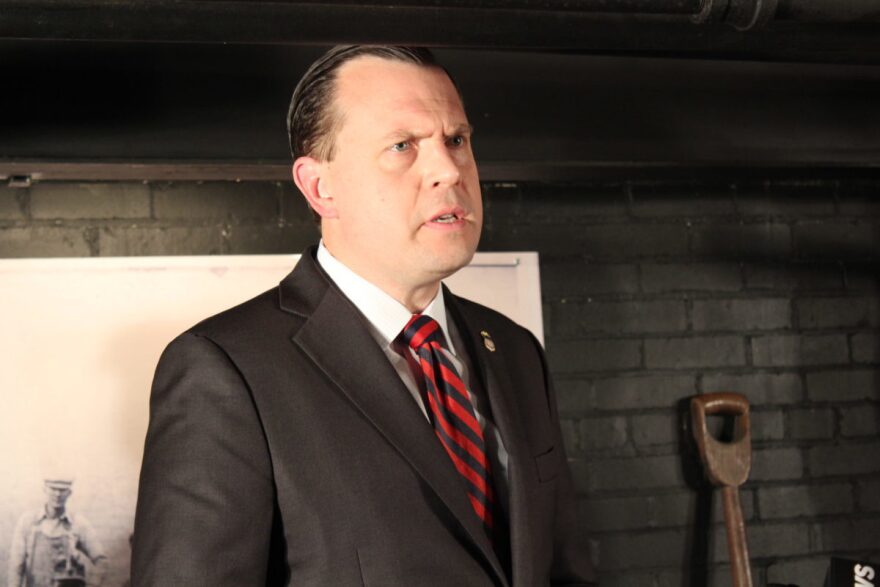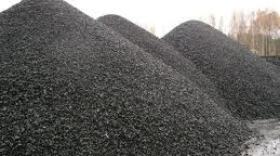Western Kentucky District U.S. Attorney Russell Coleman didn’t hide his emotion when announcing federal charges against a coal company for faking coal dust samples.
“This is one of those that just made me angry, it just made me angry to see the impact on these miners,” Coleman said.
Coleman unsealed indictments Wednesday against eight employees of the now-bankrupt Armstrong Energy coal company for falsifying dust monitoring samples in two of its Kentucky mines.
“What the grand jury is charging and what the United States will prosecute is lying and cheating by a coal company to prevent the appropriate testing of this dust to protect miners,” Coleman said at a press conference in Owensboro.

Controlling coal dust is important both to prevent the potential for explosions in mines and to limit miners’ exposure to dust, which causes lung disease. The region is experiencing an epidemic in cases of black lung disease.
Those charged include a superintendent, safety director and section foreman at Armstrong’s Parkway Mine and a safety director at the company’s Kronos mine. The indictments refer to Armstrong Coal Company as “an unindicted co-conspirator.” No executive level officials at Armstrong Energy have been charged but Coleman pointedly did not rule out the chance for further indictments.
“We always continue to review documents, continue to interview witnesses and a superseding indictment in any matter is always a possibility,” he said.
Miners Spoke Out
Coleman said whistleblowers who worked in the mines were critical to bringing the charges.
“At the end of the day, those that want to cheat in a complex industry like that will always attempt to cheat,” he said. “So the best witnesses, the best sources of information, are the miners themselves.”

Acting on a tip from miners, federal inspectors found violations at Armstrong Energy’s Parkway and Kronos mines.
The federal Mine Safety and Health Administration, or MSHA, carried out several “impact” inspections at Armstrong Energy coal mines in Kentucky between 2014 and 2017. The special inspection program started under the Obama administration and focused on mines that MSHA said “merit increased agency attention and enforcement due to their poor compliance history or particular compliance concerns.”
MSHArecords show the two Armstrong mines were cited for ventilation system problems and had a rate of violations higher than the national average for similar mines.
Mike Wilson, a former miner at Armstrong mines, was among those who alerted inspectors. Wilson said cheating on dust samples was common at many mines and that miners had little choice in the matter.
“I done it at all of them,” Wilson said. “Tampered with the dust pump at all of them. You had to do it their way or you didn’t stay.”
Lexington, Kentucky, attorney and mine safety expert Tony Oppegard said Wilson and two other Armstrong Energy miners contacted him in early 2014 to ask about their rights and report about cheating underway at Parkway mine, including placement of the dust monitoring pumps that some miners wear.

"The company was taking them off the miners and hanging them where it was less dusty," Oppegard said.
"Miners have a tough choice," he explained. "Work in excessive dust knowing they are harming themselves, but knowing if they complain they are subject to being harassed or fired."
Oppegard said one of the miners who contacted him was fired but won a discrimination suit that allowed him to return to work. But constant harassment took a toll and he found other employment.
"These guys did the right thing," he said.
None of the men still work in mines.
Wilson said he now has black lung disease.
Black Lung Surging
A2016 investigation by NPRand Ohio Valley ReSource revealed a cluster of cases of the advanced form of black lung disease among Appalachian miners that was ten times the number reported by federal regulators at the time.
Astudy released early this year confirmed the surge in black lung. Scott Laney, an epidemiologist with the National Institute for Occupational Safety and Health was involved in the study which focused on cases of complicated black lung, also called progressive massive fibrosis or PMF.
"We've gone from having nearly eradicated PMF in the mid-1990s to the highest concentration of cases that anyone has ever seen," he said.
Fraud in the coal dust sampling programs has long been a problem in the coal industry. A major scandal erupted in the early 1990s and miners in the black lung clinics of Central Appalachia frequently say they have witnessed improper or fraudulent dust monitoring over the course of their careers.
Despite improvements such as an Obama-era rule to strengthen monitoring and control of dust in mines, a recentreport from the National Academy of Sciences says the coal mining industry needs a “fundamental shift” in the way it controls exposure to coal and rock dust in order to prevent lung disease among miners.
Former MSHA director Joe Main implemented the dust control measures. In an emailed statement he expressed support for the indictments. "Tens of thousands of miners have died as a result of exposure to unhealthy coal mine dust," Main wrote. "Mine operators that cheat the system, exposing miners to excessive levels of the harmful dust should be prosecuted."
Oppegard said cheating on dust monitoring is widespread in the industry.
"I think it happens all the time," he said, adding that fraud undermines the new dust control rule. "Anyone who thinks that that is going to eliminate black lung is just fooling themselves, as long as cheating goes on."
Executive Decisions?
Celeste Monforton is a former federal mine safety official and current occupational health researcher at both George Washington University and Texas State University. Monforton said her experience in mine safety tells her that cheating on dust samples is widespread in the industry and that fraud is likely part of the reason for the epidemic of black lung cases.
“It would just be folly to think that cheating is not one of the factors that has contributed to this resurgence of black lung,” she said.

Monforton said she believes cheating on dust samples is often sanctioned or condoned by the executives of a mining company. She noted that there were no executives named in the most recent indictment.
“What I am much more eager and interested in seeing are the indictments of those top executives that are making the decisions,” she said.
Oppegard said he has to wonder whether those charged with wrongdoing in the Armstrong mines made the decisions to expose themselves to criminal liability on their own or if they they were instructed to do so.
“I don’t think many people want to go to jail for something they were told to do by somebody else,” he said.
“If that is the case here, and I don’t know that it was, but if it is, then I would expect they’re going to be willing to talk to prosecutors," Oppegard said. "That is something that people who were not indicted might have to worry about.”
Who Ran Armstrong?
Armstrong Energy's former executives have not been charged with any wrongdoing.
Company founder, J. Hord Armstrong III, is a former vice president with Arch Coal and a frequent campaign donor.Federal election records show Kentucky Republicans have been among the top recipients of his contributions.
Another former Armstrong executive, Kenneth Allen of White Plains, Kentucky, was the company’s vice president of operations. Last year,President Trump appointed Allen to the board of directors for the Tennessee Valley Authority.

Armstrong Energy's mines in Kentucky’s Ohio and Muhlenberg Counties supplied coal to power plants including the TVA’s Paradise station.
As more utilities switched from coal to cleaner and cheaper natural gas demand for coal dropped. The TVA's Paradise facility closed much of its coal capacity and opened a new gas-fired generating station last year. Armstrong Energy declared bankruptcy later the same year.
NPR's Howard Berkes contributed to this story.





